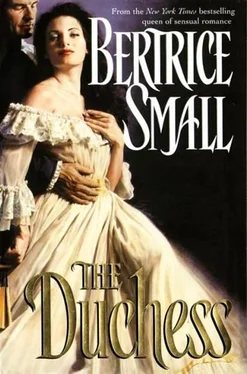"They are not very big," Eunice noted.
"You'll be able to stretch out and rest, my dear wife," the earl assured her.
"There are seven of us, and only six of those narrow little berths," the countess noted.
"I shall get my rest on the settee," the earl told her.
"Very well," Eunice agreed. "I suppose we should all go to bed now. There seems to be nothing else to do."
Wrapping themselves in their capes and cloaks, they settled themselves down for the night. Allegra awoke at one point to feel the roll of the sea beneath the vessel. It was very quiet. She could hear the wind outside just faintly. She had never been on the sea, and she wasn't certain if she was frightened or not, but everyone else seemed quite peaceful, except for some snoring. So she fell back asleep.
The next day dawned gray and damp. A light rain fell, but the winds were steady, and the seas relatively calm. The Seagull seemed to skip along the waves easily. Bobby brought them a platter of eggs, ham, and buttered brown bread. They ate gingerly, waiting to see if their food settled, but it did. They spent the day playing cards for imaginary stakes, except for Honor and the duke. Allegra's maid went over each garment Madame Paul had supplied, making certain every piece was ready to don come the morning. The duke walked the deck of the yacht as he considered what they were attempting to do lor the hundredth time. It was madness, he knew, and yet friendship demanded that they help the countess and her children.
Captain Grant joined him at one point, saying, "If the winds keep up, Your Grace, we should anchor some time tonight, late."
"How far is it into the town?" Quinton Hunter asked.
"Only a mile and a bit, Your Grace."
"You know the town?"
"Aye," the captain nodded.
"We'll need a horse and a cart," the duke told him.
"I know a man," the captain offered, "but it will cost, and you must pay in French coin, not English."
"Agreed. You will go with us?"
"Nay," the captain said. "It is better that you not be seen in Harfleur, Your Grace. These days everyone watches, and strangers are easily and quickly ferreted out."
"You are known then," the duke noted.
"I am. I will fetch the horse and cart. My friend will think it is to meet the man who helps me smuggle certain items. I always leave the horse and cart at a set location afterward so I am not seen. Let me make the arrangements, Your Grace. The cove where we will anchor is just below the road you must take to reach the Countess d'Aumont. The d'Aumonts are well known in the region for their charity. The people were devastated when the count was executed in Paris. It would not have happened here. The man with the horse and cart has a sister who labors on the d'Aumont farm. When the earl told me who you were attempting to rescue, 1 was glad that I could be of help to you."
"Thank you, Captain Grant," the duke replied.
"I will ask my friend what he knows regarding the countess's arrest," Captain Grant said.
"No, do not," the duke advised. "This man is willing to deal with you because it puts money in his pocket in particularly hard times, but he is a loyal Frenchman first. If you attempt to compromise his loyalties he may turn on you. Let him, as you have earlier suggested, believe you are merely here to smuggle wine and other goods as you usually do. Do not arouse his suspicions by even mentioning the Comtesse d'Aumont."
"You are absolutely right, my lord," Captain Grant said.
Just before sunset, although the entire day had been gray, they could just make out the outline of the French coast in the hazy distance. The duke explained to his companions that the captain would fetch them a horse and a cart for their journey. They would leave as soon after the dawn as they possibly could. They ate ham, bread, and cheese for their evening meal, drinking a rather good wine which warmed them and eased them all into sleep.
***
Bobby, the cabin boy, awoke the duke as soon as the captain departed the ship to row himself ashore. Awakened, the women stepped out onto the deck of the yacht into a chill and dank darkness, allowing the gentlemen to change into their costumes. They did not speak. The three men exiting the cabin some minutes later did not look at all like three English milords. The women returned to the cabin to change into their own garments. When they were dressed but for their mobcaps, Honor loosened their hair, tangling it, and rubbing dirt from a jar she had carried with her into their tresses. Then she passed the jar around, suggesting they dirty themselves on their faces and about the neck where their collars rested.
"Plain folk don't bathe as much as your fine ladies do," she told them in her perfect French.
"She truly can speak French," Caroline squealed.
"And you had better, lady, from now on," Honor advised. "Sound carries over the water, and we don't know who is listening."
As the maidservant's words died they all looked at one another, realizing the game, this dangerous game, was now truly on, and a careless slip of the tongue could destroy them all.
Eunice, Countess of Aston, swallowed visibly, suddenly shaken, but seeing Allegra's look of alarm, said calmly in her rather good French, "It is all right, Allegra. I am afraid, but ready to do my part."
"We cannot call ourselves by our own Christian names," Allegra said softly. "We will need simple French names. I will be Marie. Honor, you are the only one who can keep her name. Honneur. Eunice, you are now Jeanne, and Caroline, Prunelle. We must tell the men, and rechristen them as well." She pulled her mobcap over her long snarled black hair. "Allons, mes amies!" The four women exited the cabin.
The name change explained to them, the gentlemen became Joseph, the duke; Pierre, the earl; and Michel, Lord Walworth. Then they waited. When the captain returned they exchanged places with him in the rowboat.
"Gawd, your lordships, I wouldn't have recognized you, but that I know it is you," he exclaimed softly. "You will find the cart and the horse at the top of the path. How long should I wait?"
"Until we return, Captain Grant, unless you find yourself and my yacht in danger," the earl said. "I do not know how long it will take us to retrieve the comtesse and her family. With luck we shall be back by nightfall."
"I'll keep a single light burning at the stern of the vessel, my lord," Captain Grant said. "God bless you all, and bring you safely back to us quickly, and madame countess with you."
The duke rowed their little boat to the shore. Getting out, they pulled it up upon the beach, the sand crunching beneath their wooden shoes, then began the climb up the hillside. They were in France. The game was indeed on!
The Comtesse d'Aumont stared disbelieving at the man before her. He was stocky and of medium height. There was enough of her late husband in his face to make his words unreal. She could not believe what he was saying.
"You were his brother," she finally managed to say. "You are a d'Aumont."
"Half brother," he corrected her. "I was our father's bastard."
"You were raised with him. You were with him your whole life," Anne-Marie d'Aumont cried. "He loved and respected you."
"We were five years apart in age," the man replied. "I was raised to be his servant. I was the older, and yet he was the heir, only for an accident of birth. Now I shall have what rightfully belongs to me."
"This estate belongs to my son, the Comte d'Aumont," Anne-Marie said, her voice shaking. "Jean-Robert is the heir to Le Verger."
"Did I ever tell you how I was conceived, madame? My mother came into this house as a servant at the age of twelve. My father raped her when she was thirteen. I was born when she was fourteen. She died shortly thereafter, and I was raised by my grandmère."
Читать дальше












